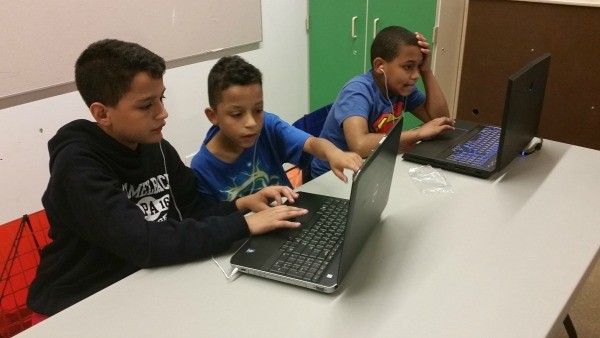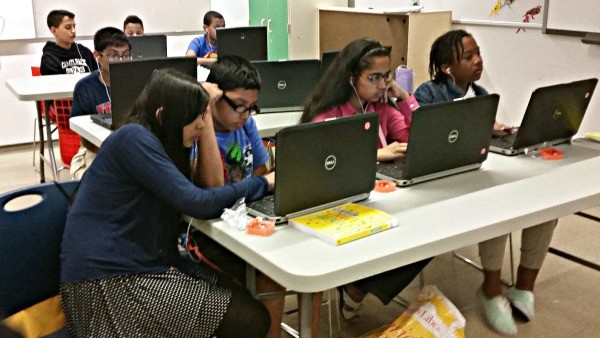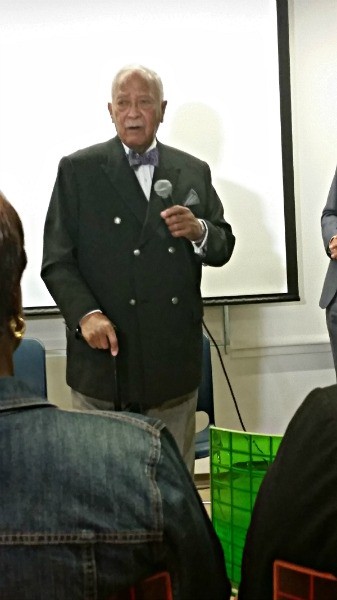Queens Library Steps Forward with Google ‘Computer Science First’ Kid Club

A younger student offers a suggestion to an older one as they take a Google CS First lesson.
The Children’s Discovery Center at Queens Central Library in Jamaica, NY, was the setting for the announcement of the Google CS First Computer Club, making its entree into New York City public libraries via 26 locations in Queens County this summer. Additional sites will be announced in the fall.
Former New York City Mayor David Dinkins; William Floyd, Google’s head of external affairs for New York and New Jersey; and Queens Library president and CEO Dennis Walcott each shared their enthusiasm about the new program. The dozen tweens in the room seemed to be even bigger fans. They dove into the demonstration, many of them laughing and raising their hands to ask questions of (or offer answers to) the instructor, Debra LoCastro. “I want to be an animator,” said Micah, 12. “I want people to look at my projects and be inspired.” Megan, 13, was surprised to realize that computer science can be used in just about every job. “I’m going to see what computer science classes are offered in high school, and take them,” she said.

These fourth to eighth grade Queens students were among the first to get a taste of the club.
The free clubs set out to increase children’s confidence in using computers and to demonstrate how computer science is permeating every area of modern life. The Google CS First curriculum is broken out into seven areas, the most popular being art, music and sound, and game design. The lessons are all conducted via instructional videos that have the kids working with the MIT block-based coding language, Scratch.
In the early 1990s, when he served as mayor, Dinkins was known as a library advocate. “Even then, we did know that public libraries served a greater purpose than as a repository of books and magazines,” he said. “For one thing, they were one of the only places some residents had air conditioning in the summer and heat in the winter.” That was part of the reason why he increased library operating hours to six days a week from five. “About three and half people knew we had done it, but that’s not important. What’s important is that we did it.”

Former New York City Mayor David Dinkins shared his lifelong love of libraries with the crowd.
Walcott asked Dinkins whether, in those days, he ever imagined we’d be talking about coding in relation to libraries. “No,” he confirmed. “We never dreamed of this,” he said, gesturing towards the bank of laptops. “I still don’t understand a lot of this!” he laughed.
Walcott turned to the kids at that point, noting a similarity between the nearly 89-year-old Dinkins and them. “He’s now part of something he never imagined. You, too, will be doing things you have not dreamed possible.”
As the students got started on a lesson called High Seas, by which they would both build a virtual boat and tell a story, a few were slowed by computer glitches. LoCastro saw an opportunity to drive home the need for tenacity. “As you grow in computer science knowledge and skill, you will always encounter challenges, bugs. What happened just now…that’s a bug. Bugs are OK. We can fix them,” she encouraged.
The interest in the clubs is evident by the fact that there are over 900 kids signed up for 300 slots. Those will be filled, at least for this summer, by lottery.
Local teens will benefit from the program along with the upper-elementary and middle school participants. Twenty high school students are being trained in coding and computer science in order to assist program attendees. The teens will get high school credit, as well as experience to add to college applications.
Google and public libraries share a mission, said Floyd. Both organize and disseminate information and are centers for tech learning. “We need more coders, more computer scientists, and we need them to be as diverse as our beautiful city,” he told the tweens. “Don’t just be consumers of content, but [be] creators. Any one of you can be the next Larry Page or Sergey Brin [co-founders of Google]. In fact, I’m counting on it.”
RELATED
ALREADY A SUBSCRIBER? LOG IN
We are currently offering this content for free. Sign up now to activate your personal profile, where you can save articles for future viewing









Add Comment :-
Comment Policy:
Comment should not be empty !!!